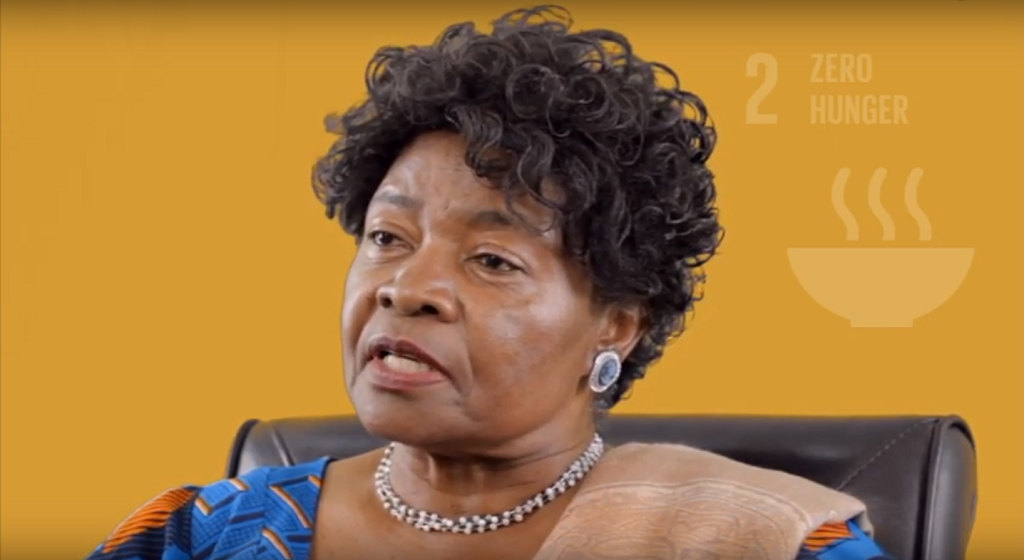CABI board member Dr Prem Warrior explains how CABI is delivering on SDG15: Life on Land
[youtube https://www.youtube.com/watch?v=F50tEAWounM?feature=oembed] CABI helps prevent, detect and limit the impact of invasive species by training government officials about the way they arrive and spread, supporting early detection and removal, and advising on natural, sustainable control (biocontrol) and pest management. By conserving biodiversity and ecosystems, we're improving the preventing and management of invasive species.
CABI board member Professor Dame Anne Glover explains how CABI is delivering on SDG12: Responsible Consumption and Production
[youtube https://www.youtube.com/watch?v=pJ1OqUUhwTY?feature=oembed] In future, farmers will need to produce more food from fewer resources. They will also need to significantly reduce crops losses. But without the right information, farmers cannot easily introduce new, highly productive and sustainable ways of farming. Sustainable production is central to CABI's work. We promote resource efficient farming and help farmers…
Irrigation facilities to enhance all year seed supply by farmers in central Uganda
Lack of access to quality seed, particularly of traditional crops that are not well integrated into the formal sector, remains a key challenge for increased productivity of these crops in African farming systems. CABI, working with national and regional partners, aims to strengthen seed systems in Africa through developing farmer seed enterprises and linkages to…
CABI board member Akhter Mateen explains how CABI is delivering on SDG1: No Poverty
[youtube https://www.youtube.com/watch?v=i3N0PEeKLOU?feature=oembed] One in five people in developing regions still live on less than $1.25 a day and many of these are the 500 million smallholder farmers around the world. But CABI is working hard to help small-scale farmers lift themselves out of poverty. We collaborate with people and organizations working across the supply chain…
CABI board member Roger Horton explains how CABI is delivering on SDG4: Quality Education
[youtube https://www.youtube.com/watch?v=RAQdE3PRzf8?feature=oembed] Sharing scientific agricultural and environmental information helps people tackle global challenges like food security. CABI creates resources that give access to science-based information on agriculture and the environment. Our mission is to improve people's lives worldwide by sharing knowledge. As a scientific publisher we produce materials for academics and researchers that make…
Why biological control is an important tool to manage problematic invasive species in Europe
Over the last few years, biological invasions have become a regular topic in the news. Today the general public is probably better informed about the negative environmental and economic impacts alien invasive species can cause than ever before. However, concern about invasive species and the search for methods to sustainably manage them has a much longer history, dating back to the 19th century
Capitalising on Africa’s agriculture to achieve ‘zero hunger’
CABI board member Professor Ruth Oniang'o talks about winning the 2017 Africa Food Prize and how CABI is working towards helping to achieve the UN Sustainable Development Goal 2: Zero Hunger.
Clear water ahead
Last month the International Institute for Sustainable Development (IISD) reported that an international measure that aims to prevent the spread of invasive aquatic species had come into force (see the full article on the IISD website). The International Maritime Organization’s (IMO) International Convention for the Control and Management of Ships’ Ballast Water and Sediments (BWM…
“Biocontrol? What’s that?”: My experience at CABI
Amy Hudson writes about what she learnt as a summer intern at CABI whilst working on the systematic review done in 2017 concerning the biological control of pests and the impact on crop yield. She spent time extracting relevant data from various online journals and compiled it so that a meta-analysis may be completed. Before…
Extension staff knowledge enhanced on ISFM practices and innovative fertilizer use
The increasing negative impact of climate change on agricultural production has led to food insecurity in many rural communities in sub-Saharan Africa. Unpredictable rainfall patterns coupled with wide spread pest and disease infestation and high input prices are some limitations smallholder farmers face in producing food. As a result, they are unable to produce at…



